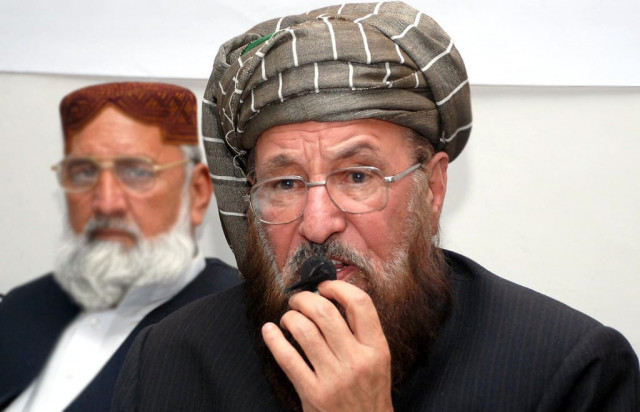Shift in power: Can JUI-S bring the Taliban to the table?
Initial attempts to establish contact with Samiul Haq signify policy shift in the government's approach to Taliban.

File photo of Maulana Samiul Haq. PHOTO: INP
Pakistan Muslim League-Nawaz (PML-N) Chief Nawaz Sharif and Khyber-Pakhtunkhwa (K-P) chief minister designate Pervez Khattak made contact with Jamiat Ulema-e-Islam-Sami (JUI-S) Chief Maulana Samiul Haq to discuss the possibility of a peaceful settlement with the Taliban.
Sami, who is in his late seventies, heads Darul Uloom Haqqania, one of the largest Deobandi seminaries in the country. In the past, this seminary has issued an honorary degree to Taliban leader Mullah Mohamad Omar.
Why the JUI-S?
These initial attempts to establish contact with Sami signify a policy shift in the new government’s approach to the Taliban as the JUI-S has never been accorded such importance in reaching a political settlement to Pakistan’s bloody insurgency.
Professor Khadim Hussain, an analyst and academic at Islamabad’s Quaid-e-Azam University, believes even though Sami does not have much political clout, his seminary had been a strong recruitment ground for militants in the early 1980s and 1990s.
“So now Sami enjoys significant influence over several diverse militant groups such as the Tehreek-e-Taliban Pakistan (TTP), groups affiliated with Difa-e-Pakistan Council (DPC) and the Afghan Taliban,” explains Hussain. “Perhaps this is the reason he is being considered for the role.”
JUI-S Provincial Amir Maulana Yousaf Shah told The Express Tribune Khattak had personally visited Sami, while Nawaz had also made contact regarding peace talks. “This issue needs to be resolved through dialogue and we have been saying this from day one,” he argued.
Shah added if the politicians were really interested, Maulana Sami could play a role in the reconciliation process. However, Shah laid emphasis on the military’s nod of approval as well.
“Sami will play his role when rulers and the powers that be are ready to solve these issues through dialogue,” stated Shah. It is the military which is primarily party to a dispute, not the politicians. “There can be no solution without the army’s agreement.”
Shah maintained Sami had enough clout in the tribal areas as many influential clerics were his disciples to assist in talks with the TTP. He claimed unless the new government refused to bow down to the United States, there could be no agreements with the Taliban.
Fazl left in the cold
As things currently stand, the Jamiat Ulema-e-Islam (JUI-F) has been passed over by incoming government for Sami. It remains to be seen how the JUI-F will react to this development, especially since it often claims to be the country’s largest religiously-inclined political party.
A few months ago, the JUI-F had constituted a grand jirga comprising tribal elders from all agencies in the Federally Administered Tribal Areas. JUI-F chief Fazlur Rehman had shown a keen interest in laying down a proper mechanism which would facilitate dialogue with the Taliban.
Following the assassination of K-P senior minister Bashir Ahmed Bilour, Fazl presented the jirga as the only viable forum to discuss peace with the militants. On these grounds, he gathered several political leaders in Islamabad in February at an all-parties conference (APC).
At this moment in time it was premature to comment as the new government had not yet been formed, said JUI-F spokesperson Haji Jalil Jan. He asserted his party had not been bypassed or ignored in the process. The declaration of February’s APC stated all peace talks would take place under the auspices of Fazl’s jirga. “Nawaz Sharif himself signed that declaration,” Jan reminded.
Professor Khadim Hussain, however, had doubts about the militants ultimately accepting Fazl’s lead in the peace process. He explained Fazl had been part of the country’s political machinery in one capacity or the other for a considerable period of time. He still aspires to be involved and militants will not easily accept him as a mediator for this very reason, added Hussain.
Despite this analysis, Hussain maintained it was unlikely that either Fazl or Sami could effectively negotiate with the TTP as militants continue to carry out attacks across the country. “If talks are held with militants at this very moment, it means submitting to the Taliban’s diktats.”
Published in The Express Tribune, May 26th, 2013.













COMMENTS
Comments are moderated and generally will be posted if they are on-topic and not abusive.
For more information, please see our Comments FAQ